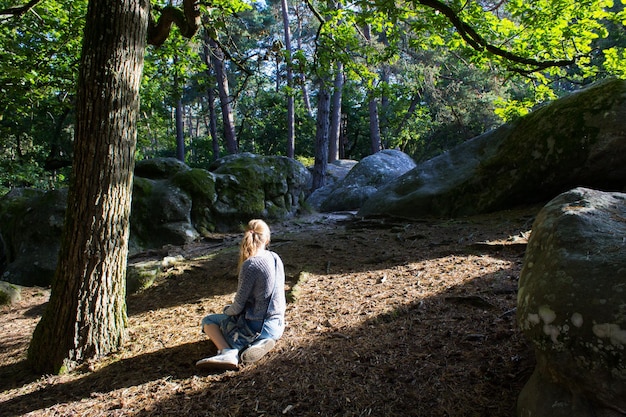Boost Your Mood: 30 Minutes in Nature for a 25% Lift

Zen and Nature: How Spending 30 Minutes a Day Outdoors Can Improve Your Mood by 25% explores the profound connection between nature and mental well-being, revealing how a short daily dose of the outdoors can significantly elevate your mood and overall happiness.
Discover how spending just 30 minutes a day immersed in nature can radically improve your mood by 25%. Explore the science, practices, and benefits of connecting with the natural world to enhance your mental and emotional well-being.
The Power of Nature: Your Daily Zen Dose
In today’s fast-paced world, finding moments of peace and tranquility can feel like a luxury. Yet, what if I told you that a simple, accessible solution to boost your mood and reduce stress is right outside your door? The practice of connecting with nature, whether it’s a walk in the park, sitting by a lake, or simply observing the greenery around you, holds transformative power for your mental and emotional state.
But how does a simple walk in the park translate to a 25% improvement in your mood? Let’s delve into the fascinating science and practices that underpin this remarkable connection between **Zen and Nature: How Spending 30 Minutes a Day Outdoors Can Improve Your Mood by 25%**.

The Science Behind Nature’s Mood-Boosting Effects
The benefits of spending time in nature extend far beyond a simple feel-good sensation. Scientific research has increasingly revealed the profound impact of the natural world on our brains and bodies. From reducing stress hormones to boosting creativity, nature offers a wealth of therapeutic effects that contribute to a more positive and balanced mood.
Stress Reduction and Cortisol Levels
One of the most well-documented benefits of spending time in nature is its ability to reduce stress. Studies have shown that exposure to natural environments can lower levels of cortisol, the body’s primary stress hormone. When we’re surrounded by greenery, the calming sights and sounds trigger a relaxation response that counteracts the physiological effects of stress.
The Role of Phytoncides
But it’s not just the visual and auditory aspects of nature that contribute to our well-being. Trees and plants emit airborne chemicals called phytoncides, which have been shown to boost our immune system and improve our mood. These natural compounds interact with our bodies on a cellular level, promoting relaxation and reducing anxiety.
- Decreased Stress Levels: Exposure to nature lowers cortisol levels, promoting relaxation.
- Immune System Boost: Phytoncides, released by trees, enhance immune function.
- Improved Mood: Natural environments stimulate positive emotions and reduce negative thoughts.
- Enhanced Cognitive Function: Nature walks improve attention span and cognitive performance.
In conclusion, the science behind nature’s mood-boosting effects is compelling. From reducing stress hormones to enhancing immune function, the natural world offers a myriad of benefits that contribute to our overall well-being. By understanding these scientific mechanisms, we can appreciate the profound impact that even a short dose of nature can have on our daily lives.
Creating Your Personal Zen Sanctuary Outdoors
While scientific understanding of the benefits of nature is valuable, putting that knowledge into practice is where you’ll truly experience the transformative effects. Creating a personal zen sanctuary outdoors doesn’t require a vast wilderness or perfectly manicured garden. It simply involves identifying a space where you can connect with nature in a way that resonates with you.
Finding Your Ideal Nature Spot
The first step in creating your outdoor zen sanctuary is to identify a location where you feel comfortable and at peace. This could be a local park, a nearby forest, a quiet garden, or even a small balcony with potted plants. The key is to choose a space that you find visually appealing and that allows you to escape from the distractions of daily life.
Mindful Practices for Enhanced Connection
Once you’ve found your ideal nature spot, incorporate mindful practices to deepen your connection with the environment. This could involve engaging your senses by paying attention to the sights, sounds, smells, and textures around you. You might also try practicing mindful breathing or meditation in your outdoor sanctuary.
- Find a Quiet Spot: Identify a place where you can relax and connect with nature without distractions.
- Engage Your Senses: Pay attention to the sights, sounds, smells, and textures of the natural world.
- Practice Mindful Breathing: Focus on your breath to calm your mind and deepen your connection to the environment.
- Incorporate Meditation: Use your outdoor sanctuary as a space for meditation and reflection.
Creating your personal zen sanctuary outdoors is an ongoing process. Experiment with different locations, practices, and times of day to discover what works best for you. By intentionally connecting with nature in a mindful way, you can cultivate a sense of peace, tranquility, and well-being that permeates your entire life.
30 Minutes to a Better You: Practical Tips
While the concept of spending time in nature may seem straightforward, making it a consistent part of your daily routine requires a bit of planning and intention. The good news is that you don’t need to carve out hours of your day to reap the benefits. Even 30 minutes of dedicated time in nature can have a significant impact on your mood and overall well-being.
Scheduling Nature Time
One of the most effective ways to ensure that you get your daily dose of nature is to schedule it into your calendar. Treat it like any other important appointment and commit to honoring that time. Whether it’s a morning walk, a lunchtime stroll, or an evening meditation in the garden, planning ahead will help you stay consistent.
Incorporating Nature into Daily Activities
Even if you can’t dedicate a full 30 minutes at once, you can still incorporate nature into your daily activities. Take a walk during your lunch break, choose a scenic route for your commute, or simply sit by a window and observe the outdoors while you work. These small moments of connection can add up and make a big difference in your mood.

- Schedule It: Treat your nature time like an important appointment and commit to it.
- Break It Up: Incorporate short bursts of nature into your daily activities.
- Make It a Habit: Integrate nature into your routine to make it a sustainable practice.
- Enjoy the Process: Focus on the present moment and savor the sensory experience of nature.
Integrating 30 minutes of nature into your daily routine doesn’t have to be a chore. By scheduling it, incorporating it into your activities, and making it a habit, you can reap the mood-boosting benefits of the natural world without disrupting your busy schedule. Remember, even small moments of connection can make a big difference in your overall well-being.
Zen Principles in Nature: Finding Mindfulness Outdoors
The principles of Zen, with their emphasis on mindfulness, presence, and connection, align beautifully with the experience of being in nature. By bringing a Zen mindset to your outdoor explorations, you can amplify the benefits and deepen your connection to both yourself and the environment.
Mindful Observation
One of the core practices of Zen is mindful observation – paying attention to the present moment without judgment. When you’re in nature, practice observing the details around you – the shapes of the leaves, the colors of the flowers, the sounds of the birds. Notice the subtle shifts in your environment without getting caught up in thoughts or interpretations.
Embracing Impermanence
Zen also emphasizes the concept of impermanence – the understanding that everything is constantly changing. In nature, this is readily apparent. The seasons change, the leaves fall, and the landscape evolves over time. By embracing impermanence, you can learn to let go of attachment and find peace in the present moment.
- Practice Mindful Observation: Pay attention to the details of your surroundings without judgment.
- Embrace Impermanence: Accept that everything is constantly changing and find peace in the present moment.
- Cultivate Gratitude: Appreciate the beauty and abundance of the natural world.
- Connect with the Present: Ground yourself in the here and now, letting go of worries about the future or regrets about the past.
By applying Zen principles to your nature experiences, you can transform a simple walk in the park into a profound and transformative practice. Cultivating mindfulness, embracing impermanence, and connecting with the present moment can help you find peace, clarity, and a deeper appreciation for the beauty of the natural world.
Overcoming Obstacles: Making Nature Accessible
While the benefits of spending time in nature are undeniable, many people face obstacles that make it difficult to access natural environments on a regular basis. Whether it’s a lack of time, limited transportation, or physical limitations, these challenges can prevent individuals from experiencing the mood-boosting effects of the outdoors. However, with creativity and perseverance, it’s possible to overcome these obstacles and make nature more accessible to everyone.
Creative Solutions for Limited Time
Even if you have a busy schedule, there are ways to incorporate nature into your life without sacrificing other commitments. Take a walk during your lunch break, listen to nature sounds while you work, or bring plants into your home or office. These small touches can help you connect with nature even when you’re short on time.
Accessibility for All
For individuals with physical limitations, accessing natural environments can be particularly challenging. Look for parks and trails that are wheelchair accessible, or explore gardens and botanical centers that offer accessible features. If you’re unable to go outdoors, bring nature indoors by creating a calming space with plants, natural light, and soothing sounds.
- Utilize Small Moments: Incorporate short bursts of nature into your daily activities.
- Embrace Technology: Use nature sounds, videos, and virtual reality to connect with the outdoors from indoors.
- Create Accessible Spaces: Seek out parks and gardens that offer accessible features for individuals with physical limitations.
Overcoming obstacles to accessing nature requires creativity, resourcefulness, and a commitment to prioritizing your well-being. By finding innovative solutions and advocating for accessible natural environments, we can ensure that everyone has the opportunity to experience the mood-boosting benefits of the outdoors.
Tracking Your Progress: Measuring Mood Improvement
While anecdotal evidence of nature’s mood-boosting effects is compelling, tracking your progress can provide concrete evidence of the positive impact it’s having on your well-being. By using simple tools and techniques, you can monitor your mood and identify the specific benefits you’re experiencing from spending time in nature.
Mood Journaling
One of the easiest ways to track your mood is to keep a journal. Each day, take a few minutes to reflect on your mood and write down any observations about how you’re feeling. You can also rate your mood on a scale of 1 to 10 to track changes over time. Be sure to note when you’ve spent time in nature and any specific activities you engaged in.
Using Mood-Tracking Apps
There are also a variety of mood-tracking apps available for smartphones and tablets. These apps allow you to log your mood, track your activities, and identify patterns in your emotional state. Some apps even offer features like guided meditations and journaling prompts to help you deepen your self-awareness.
- Keep a Mood Journal: Reflect on your mood and write down observations about your emotional state.
- Use Mood-Tracking Apps: Utilize technology to log your mood, track activities, and identify patterns.
- Reflect on Your Experiences: Take time to consider the specific benefits you’re experiencing from spending time in nature.
Tracking your progress doesn’t have to be complicated or time-consuming. By using simple tools and techniques, you can gain valuable insights into the impact of nature on your mood and overall well-being. This can provide motivation to continue prioritizing time outdoors and deepen your commitment to your personal zen practice.
| Key Point | Brief Description |
|---|---|
| 🌳 Nature’s Impact | 30 minutes outdoors can boost your mood by 25%. |
| 🧘 Zen Principles | Mindfulness enhances the benefits of nature. |
| ⏱️ Daily Routine | Schedule or incorporate nature into daily activities. |
| 📈 Mood Tracking | Monitor your emotional state to see nature’s effect. |
FAQ
▼
Spending time in nature reduces stress hormones like cortisol and increases endorphins, promoting a sense of calm and well-being. Being outdoors also stimulates your senses, diverting attention from negative thoughts.
▼
Even in urban environments, you can find small pockets of nature. Visit parks, gardens, or seek out rooftop oases. Bringing plants into your home can also help create a natural environment.
▼
While virtual nature experiences can be relaxing, they don’t offer the same sensory stimulation or physical benefits as being in the real outdoors. They can be a good supplement, but not a replacement.
▼
Even brief moments in nature can be beneficial. Try taking a 5-minute walk during your break or sitting by a window with a view of nature. Any amount of time is better than none!
▼
Engage your senses fully. Pay attention to the sights, sounds, smells, and textures around you. Practice deep breathing and focus on the present moment, letting go of distractions and worries.
Conclusion
Incorporating even a short 30-minute dose of nature into your daily routine has the potential to significantly boost your mood and overall well-being. By understanding the science behind nature’s benefits, creating your personal Zen sanctuary, and practicing mindfulness in the outdoors, you can unlock a world of happiness and tranquility. Embrace the power of nature and embark on your journey to a better, more balanced you!





